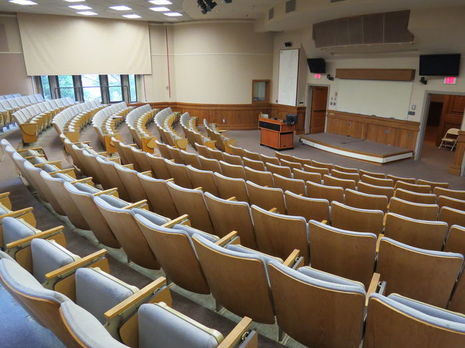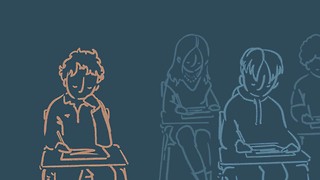Ignored and let down: being Deaf at Cambridge
The University desperately needs better disability training so it can actively support its students

My first year of Cambridge as a Deaf student has taught me, above all, that its disability provisions are woefully inadequate. My initial problem was obtaining a notetaker. Throughout my first term, I was constantly having to meet and liaise back and forth with different departments within my university as well as external DSA companies. I kept my patience for so long, being optimistic that it would get sorted any moment soon, pushing down concerns that the mounting academic note-making that had been missed had already taken too great a toll. One day more than halfway through my first term, the notetaking company finally told me that they had found someone to cover my lectures. So, I showed up to my next lecture, only to be told that the notetaker would be unable to attend that lecture, nor any of my future lectures. I had been stood up by my academic support and thus I was back to square one.
Before my first lecture in Michaelmas, I began to tense up and the worries I had been trying to ignore kicked in — will I be able to get a seat near the front so I can hear? How will I be able to keep up with, and focus on, my intense Cambridge lecture without a notetaker? The fear that the other students (most of whom did not know I’m Deaf) are thinking that I have special needs and that I can’t manage on my own. It isolates and differentiates me from them as well, making me feel I don’t belong within the social bubble of all the other students. All these worries kept circulating in my head despite my efforts to push them away and still often do.
“I am left feeling like I am being unreasonable for asking for accommodations that are required by law”
In one of my first lectures, I had an experience that only worsened my anxieties and lack of confidence in going to lectures. I explained to the lecturer that I was Deaf and was asking him to wear my microphone device so I could hear him. When I went back to my seat, I noticed that he had left my radio-aid microphone on the desk, and he had moved away from it. I reassured myself that he was going to pick it up any second and wear it before he started the lecture. But then he started talking, and he continued talking, but I couldn’t hear what he was saying. I realised I needed to do something, otherwise I would be sitting there for the next hour hearing absolutely nothing whilst all the other students scribbled away and typed their notes. I didn’t want to raise my hand and interrupt the lecture, but I didn’t have a choice.
So, I raised my hand and asked him to wear my microphone — he did so but then he pointed his finger at me and said in front of everyone that “this lecture is being recorded for your benefit only” and that I was having it double recorded — he seemed to think my microphone was a recording device! It felt like he wasn’t taking my Deafness seriously enough and I felt singled out by him. For the rest of that hour, I felt so embarrassed that I barely took in a word of what the lecture was about. And even though the battery of one of my hearing aids ran out and I needed to change it, I felt too self-conscious to do so. I sat there with it not working until the lecture ended. My confidence had declined again, and I was even more hesitant to go to lectures. This is an example of where Deaf awareness training could have prevented such an incident from occurring, as well as just having a basic sensitivity towards those with disabilities.
“It often feels like I am doing the job of the university, rather than the other way around”
Compulsory disability training is desperately needed, as is a better system for communication and enforcement of access arrangements between the disabilities department and the subject faculties. I have had to navigate a system that often fails to understand or accommodate my needs. Despite providing my SSD detailing my needs, it seems that this document is often overlooked or ignored. This document is not just a suggestion, it is a legal requirement, yet it feels like some professors and academics see it as a mere inconvenience that can be ignored in favour of more “important” matters. I am often left feeling like I am being unreasonable for asking for accommodations that are required by law.
All people and disabilities are different and require different accessibility-related accommodations. Yet the disabilities service at the university seems to lack sufficient specialist knowledge and departments needed to support students with a range of different disabilities. I am constantly having to educate them on what they should already know, and even then, the university often fails to take on board the information I provide. I have had to find appealing videos, send out bite-sized pieces of information and spend my time making flashy infographic cards with deaf awareness tips to get their attention, yet they still seem unable to implement the necessary adjustments. The burden of self-advocacy falls on me, even though the university should be taking steps to ensure that disabled students can learn on an equal footing with their peers. It often feels like I am doing the job of the university, rather than the other way around.
The burden of adapting to a system that is not designed for disabled students should not fall upon the student. It is time for Cambridge as an institution to take action and make meaningful, practical changes towards accessibility and inclusivity.
 Comment / Anti-trans societies won’t make women safer14 November 2025
Comment / Anti-trans societies won’t make women safer14 November 2025 News / Controversial women’s society receives over £13,000 in donations14 November 2025
News / Controversial women’s society receives over £13,000 in donations14 November 2025 News / John’s rakes in £110k in movie moolah14 November 2025
News / John’s rakes in £110k in movie moolah14 November 2025 Fashion / You smell really boring 13 November 2025
Fashion / You smell really boring 13 November 2025 Music / Three underated evensongs you need to visit14 November 2025
Music / Three underated evensongs you need to visit14 November 2025










